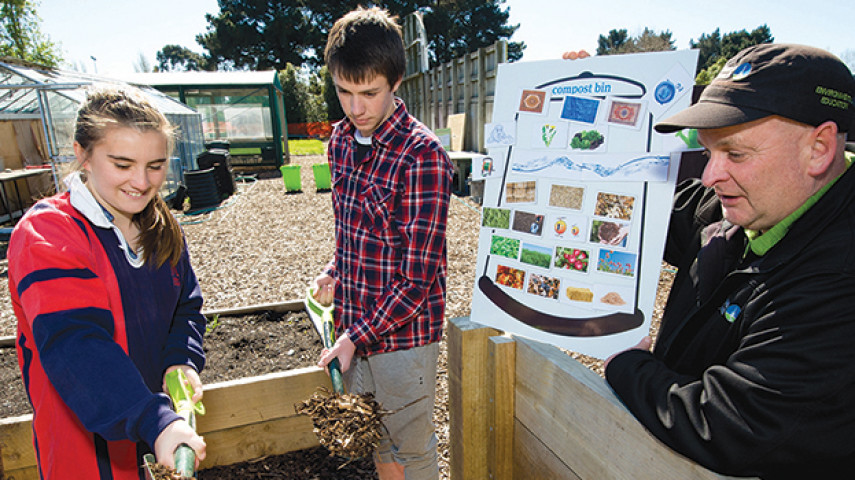Learn the science behind using organic waste as a resource by turning it into natural fertiliser.

Book a Learning Through Action school programme
Risk analysis and management information (RAMS) will be sent out once a programme booking is confirmed. If you require this at any other stage please email LTA@ccc.govt.nz or contact us(external link).

| Year level | 4 to 13 |
|---|---|
| Curriculum Level | 2 to 8 |
| Availability | Year-round |
| Times | 9.15am to 11.45am or 12.15pm to 2.30pm |
| Site | EcoDepot/EcoDrop Metro Place Bromley |
| Cost | Free |
| Number of students | Maximum of 35 |
| Special requirements | Closed-in shoes must be worn |
- Organic waste as a resource.
- Hot heap composting, worm farm composting, EM Bokashi composting.
- Sustainability.
- Natural cycles for dealing with waste.
- Personal and social responsibility for action.
Students will learn the six important ingredients for high-quality compost and how to use them for successful hot heap composting.
Students can then either:
- Discover how to maintain a worm farm by correct feeding, providing suitable bedding, harvesting worm castings and preparing and using worm leachate (liquid fertilizer), or
- Discover how effective microorganisms (EM) can be used to compost food scraps by anaerobic fermentation.
We are learning to:
- Explain how to use organic waste as a resource.
- Identify the six key ingredients for successful hot heap composting.
- Explain the process and methods of making compost at home or at school.
- Identify actions they can take to encourage better use of organic resources in their lives
- Identify the correct materials that go into the organics wheelie bin and explain some maintenance tips.
Using language, symbols and texts
Students will interpret images, symbols and text to understand and describe different aspects of the composting process.
Thinking
Students will use cognitive and critical thinking skills to problem-solve and expand their knowledge of different composting systems.
Managing self
Students will have the opportunity to adopt and adapt composting practices and to develop resourcefulness around organic waste.
Participating and contributing
Students will learn how to contribute to the sustainability of their home and/or school environment.
Relating to others
Students will work collaboratively and supportively to complete tasks; take turns and support their classmates.
| Curriculum area | Strand and level | Objective |
|---|---|---|
| Science Pūtaiao |
Nature of Science Levels 2 to 8 |
Investigating in science Communicating in science Participating and contributing |
| Living World Levels 2 to 8 |
Life processes Ecology Evolution |
|
| Material World Level 2 to 5 |
Chemistry and society | |
| Technology Hangarau |
Technological Practice Levels 2 to 4 |
Planning for practice Brief development Outcome development and evaluation |
| Technological Knowledge Levels 2 to 6 |
Technological products Technological systems |
|
| Social Sciences Tikanga ā-Iwi |
Levels 2 to 5 | Social studies |
| Health and Physical Education Hauora |
Healthy Communities and Environments Levels 2 to 3 |
People and the environment |
Level 1
| Subject | Standard |
|---|---|
| Agricultural and horticultural science | 1.5 AS90160 |
| Biology | 1.3 AS90927 |
| Chemistry | 1.2 AS90931 |
| Science | 1.2 AS90949 1.7 AS90950 |
| Generic Technology | 1.5 AS91048 1.6 AS91049 1.7 AS91050 1.8 AS91051 1.9 AS91052 1.10 AS91053 1.11 AS91054 |
| Processing Technologies | 1.60 AS91082 1.61 AS91083 |
Level 2
| Subject | Standard |
|---|---|
| Agricultural and horticultural science | 1.2 AS91290 2.4 AS91292 |
| Biology | 2.3 AS91155 2.8 AS91160 |
| Environmental Sustainability | 2.1 AS90810 2.2 AS90811 2.3 AS90813 2.6 AS90814 2.4 AS91733 2.5 AS91734 |
| Home Economics | 2.4 AS91302 |
| Social Studies | 2.4 AS91282 |
| Generic Technology | 2.6 AS91359 2.9 AS91362 2.10 AS91363 2.11 AS91364 |
| Processing Technologies | 2.61 AS91352 |
Level 3
| Subject | Standard |
|---|---|
| Biology | 3.2 AS91602 |
| Environmental Sustainability | 3.1 AS90828 3.2 AS91735 3.3 AS91736 3.5 AS90832 |
| Home Economics | 3.3 AS91468 |
| Generic Technology | 3.1 AS91608 3.2 AS91610 |
Related news

Milestone moment as first seat installed at new stadium
The first seat has been installed at One New Zealand Stadium at Te Kaha.
26 Jun 2025
News in brief from the Christchurch City Council meeting
Improvements on Moorhouse Avenue, speed limits around schools, tsunami sirens and Central City development contributions – here are the key decisions made at today's Christchurch City Council meeting.
18 Jun 2025
Creative collaboration to feature at Tīrama Mai
This year’s Puanga Matariki festival in central Christchurch will showcase a range of artistic lighting and cultural displays – including a revamp of a crowd favourite.
10 Jun 2025